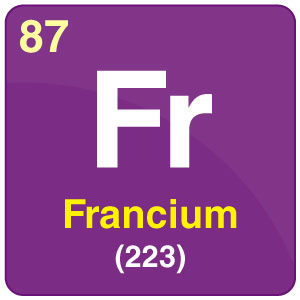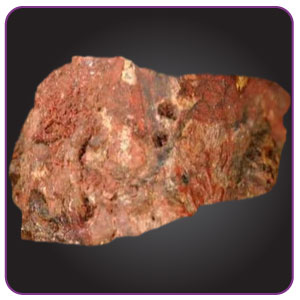Francium (Fr)

| Symbol | Fr |
| Atomic Number | 87 |
| Atomic Mass | 223 g/mol |
| Discovered by | Marguerite Perey in 1939 |

Chemical Properties of Francium
| Group | 1 | Melting point | 21°C, 70°F, 294 K |
| Period | 7 | Boiling point | 650°C, 1202°F, 923 K |
| Block | s | Density (g cm−3) | Unknown |
| Atomic number | 87 | Relative atomic mass | [223] |
| State at 20°C | Solid | Key isotopes | 223Fr |
| Electron configuration | [Rn] 7s1 | CAS number | 7440-73-5 |
| ChemSpider ID | 4886484 | ChemSpider is a free chemical database | |
Properties of Francium
- Francium is the least found metal on the planet earth and is rarely found in nature. It is considered to be the second rarest metal discovered on the earth’s crust next to the Astatine.
- Francium is an element with the chemical symbol Fr and atomic number 87 in the periodic table. It is produced both naturally and by artificial methods.
- Most probably, it is assumed that about 340-550 grams of this metal francium are found in the earth’s crust. Francium has a half-life of only 22 minutes.
- Francium occurs on the decay of the alpha particles, which are found in the minerals of uranium. Francium is obtained by the neutron bombardment of radium in a nuclear reactor. It can also be made by bombarding thorium with protons.
- This metal has about 34 isotopes that are said to be occurring in nature. Francium has only 1 valence electron.
Uses of Francium
Since francium is produced in tiny quantities in nature, it does show any much commercial applications.
- Francium has been used in the field of research, chemistry and also in the atomic structure.
- It is used for diagnostics for curing cancers.
- It is also used in many spectroscopic experiments.
- Francium is a highly radioactive metal, and since it exhibits a short half-life, it does not have more impact on the environment.

Comments